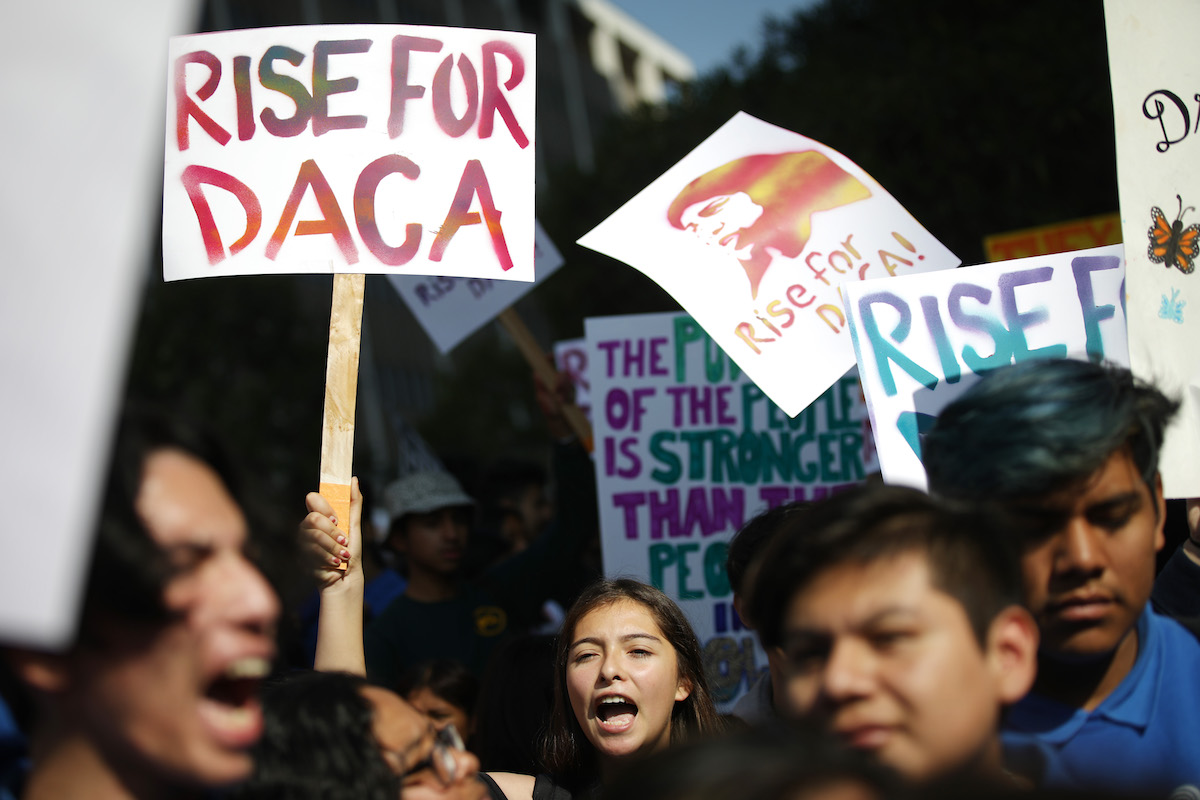

Students and supporters rally in support of DACA recipients on the day the Supreme Court hears arguments in the Deferred Action for Childhood Arrivals (DACA) case on November 12, 2019 in Los Angeles, California. (Photo by Mario Tama/Getty Images)
The Supreme Court has an important decision to make this sitting: whether people like me matter.
As a gay DACA recipient, the nine Justices will determine what rights I deserve in the country I call home, the country that once protected me but is now willing to betray me because of who I love and where I come from.
In the summer of 2015, The landmark decision legalizing gay marriage nationwide gave me hope and reminded me of the brilliance of our democratic experiment. However, this moment —which for so many marked an advancement in humankind— was short-lived. Almost immediately after this victory, it was eclipsed by relentless attempts to intimidate and strip LGBTQ people of our human rights.
Having to navigate a life of rejections, discrimination, and humiliation as a gay Latino in Texas was only compounded by my immigration status. This continuous battle seemed to temporarily improve with the implementation of the Deferred Action for Childhood Arrivals (DACA) program in June 2012.
When it was announced that the Court would be hearing the cases to rescind DACA and LGBTQ discrimination within months of each other, I was spurred back into action, with the vivid images of our past protests for liberty still fresh on my mind. After years of making our demands for equality heard, we will be either silenced or affirmed by a potential 5-4 decision some time next year.
Our country deserves permanent solutions regarding DACA and LGBTQ discrimination. These Supreme Court cases are just the culmination of America’s ongoing fight with its bigoted system. Marginalized communities have been taught to rely on the Court to protect their rights and to protect them from being harmed by law enforcement officers in New York (the Stonewall Riots) and here in my state (the Texas Rangers). We have been told to rely on the Court while lawmakers in Congress sit on bills like the Equality Act and Dream Act, which would deliver real solutions. America must reject discrimination and racism and embrace diversity and equality.
As the Court hears the opening arguments in these cases, discriminatory acts are on the rise against immigrants and hate crimes against transgender women. Over 20 transgender or gender non-conforming people have been fatally shot or killed by other means in 2019 and there is still a month left to go, according to the Human Rights Campaign. Among those killed is Johana “Joa” Medina, a 25-year-old who died at a hospital in El Paso hours after she was released from ICE custody. She dreamed of working as a certified nurse in the U.S. after being unable to practice as a transgender woman in her home country. Fellow Latina, Layleen Polanco, was a 27-year-old who was found dead in a cell at Rikers Island. She was described as a “sweet,” “generous,” and “amazing” person by those who knew her.
Coretta Scott King once said, “Struggle is a never-ending process. Freedom is never really won. You earn it and win it in every generation.” In the midst of an anti-Latino and anti-immigrant sentiment that has permeated the country, there has never been a more critical time to fight for our dignity, our rights, and our freedom.
No Donald! That would be a monumental mistake.
The majority of America’s support DACA and a pathway to citizenship. https://t.co/EIFsPY8whx
— Antonio Arellano (@AntonioArellano) November 14, 2019
Searing discrimination towards the LGBTQ community and unabashed racism against Latinos is as American as apple pie. The earliest cases of discrimination stem from early disputes over Spanish and Mexican territories but LGBTQ Latinos are particularly vulnerable to workplace exploitation, immigration policies, and hate crimes. Despite continuous setbacks on the journey to equality, LGBTQ Latinos haven’t shied away from making their voices heard. This marginalized subgroup has great role models in individuals like José Julio Sarria, the first openly gay candidate for public office in the U.S.; Sylvia Rivera, a bisexual and transgender rights activist credited with starting the Stonewall Riots; and Gloria Anzaldúa, a renowned Chicano history scholar and lesbian rights advocate. Despite insurmountable progress, work still lies ahead and it is up to the new generation of LGBTQ advocates to continue the good fight.
The future of young undocumented people with hopes and dreams of changing the lives of their families, their communities and the country now rests on the nine Justices of the Supreme Court. By deciding who gets protection and who doesn’t in this country, they will effectively decide how this country will look like moving forward. America must propel humankind toward a future of inclusion where differences such as social status and gender identity are set aside for the common good. We live in increasingly divisive times, and this decision will be key in setting the stage on whether we will continue divided or will work toward unity and a common vision for the pursuit of life, liberty, and happiness for all.
America must make amends with the past and recognize the progress of society. This starts by recognizing and appreciating the diversity and equality that makes us great. Our country’s Constitution begins with the words “We The People.” By upholding the rights of LGBTQ and undocumented people, the Supreme Court would finally make that “We” more like me.
***
Antonio Arellano is the Interim Executive Director of Jolt, the largest Latino progressive organization in Texas. He has been featured on NPR, The Washington Post, The New York Times, MTV, USA Today, Univision, and Telemundo, among others. Discover more about Antonio here: www.antonioarellano.com


